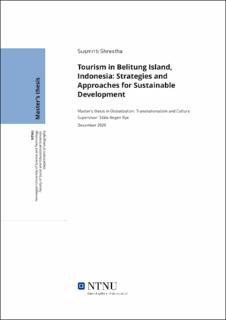| dc.description.abstract | Belitung Island in the east of Sumatra was previously a tin mining-based Island in Indonesia. This island is now moving towards various forms of economic activities other than tin-mining among which tourism has become one of the most prominent economic activities. In order to understand the potentiality of the tourism industry in Belitung Island, this study on understanding strategies and approaches for sustainable tourism was conducted in November 2019. Critical observations and in-depth interviews were the main methods used alongside the review of necessary documents. This study highlights tourism-related various activities that are taking place in Belitung Island especially after the decline of the tin mining industry. Further, it is tried to analyze how these activities contribute differently to sustainable development through tourism. This study primarily deals with the economic, social, and environmental aspects of tourism as the main basis of Sustainability. It has identified four major kinds of approaches related to tourism which are; i) eco-centric tourism focused on conservation of nature and natural resources, ii) community-focused tourism focusing on participation and improvement of livelihood of local people, iii) blue tourism that focuses on the beauty of the blue sea and the stunning islands and finally, iv) development of infrastructures-based tourism to invite more local as well as foreign tourists. These tourism approaches were broadly grouped into two categories that are mainstream tourism and alternative tourism. The sustainability aspects of these two categories of tourism differed as the mainstream tourism strategy was found to contribute more to the influx of tourists ensuring better economic outputs in the destination whereas, the alternative tourism strategy was related to environmental, social, and ecological balances. Though these categories of tourism development approach varied in terms of beneficiaries, this study analyzes that local inclusion is a key that contributes to economic growth and sustainable development through tourism.
Key Words: Tourism, Special Economic Zone, Sustainable Tourism, Sustainable Development | |
